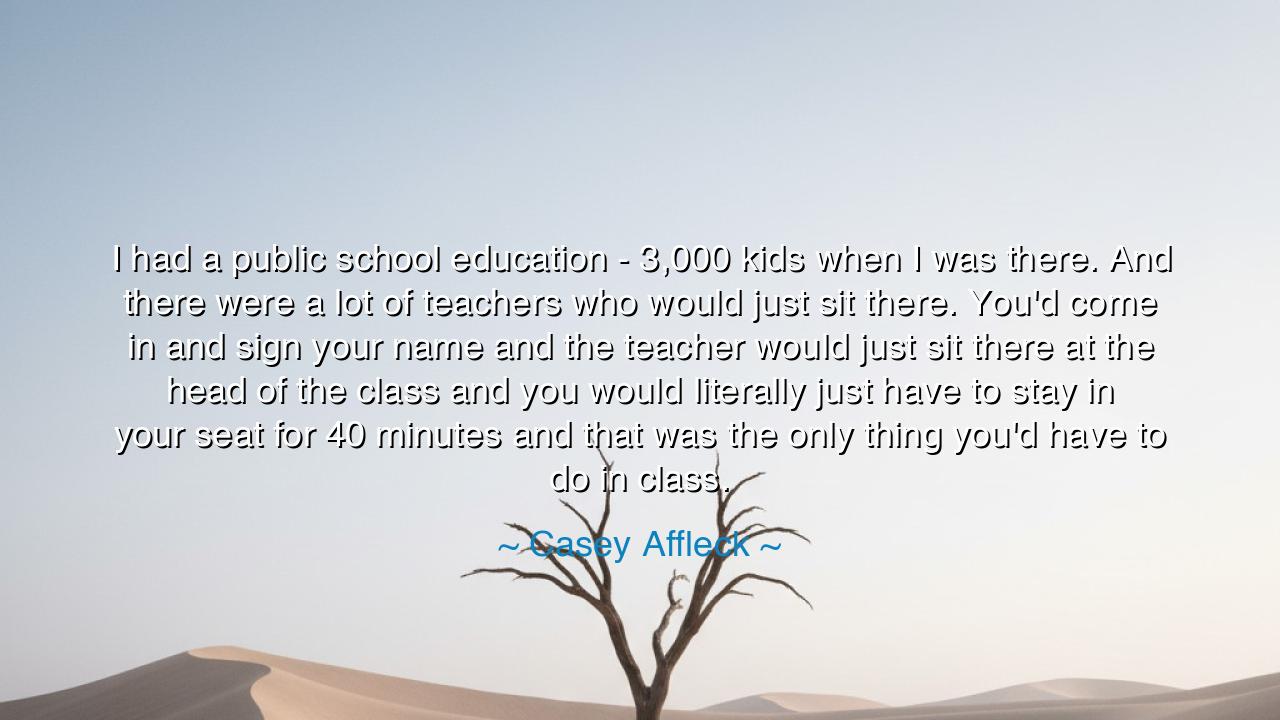
I had a public school education - 3,000 kids when I was there.
I had a public school education - 3,000 kids when I was there. And there were a lot of teachers who would just sit there. You'd come in and sign your name and the teacher would just sit there at the head of the class and you would literally just have to stay in your seat for 40 minutes and that was the only thing you'd have to do in class.






Casey Affleck once reflected on his youth with a sobering memory: “I had a public school education—3,000 kids when I was there. And there were a lot of teachers who would just sit there. You’d come in and sign your name and the teacher would just sit there at the head of the class and you would literally just have to stay in your seat for 40 minutes and that was the only thing you’d have to do in class.” These words, spoken plainly, carry a weight far beyond one man’s story. They reveal both the emptiness of neglected guidance and the hunger of the young for true leadership.
For what is the role of the teacher? Not to be a silent sentinel, guarding time like a jailer, but a guide, a flame, a voice that awakens the sleeping mind. In Affleck’s memory, the classroom became not a temple of learning but a waiting room of time. The students, instead of being fed with questions and discovery, were left to stagnate, their only task endurance. And yet, this barren place reveals a truth: that when authority grows idle, the spirit of youth must either wither or seek its own fire.
The ancients understood the sacredness of teaching. Socrates walked among his students in the agora, questioning, probing, urging them to awaken. Confucius, moving from court to court, said, “To educate without inspiring is like pouring water on stones.” Even Aristotle, tutor of kings, believed that knowledge was not to be endured but to be wrestled with, engaged with, lived with. Against this noble heritage, Affleck’s memory of idle teachers shines with tragic contrast, a warning of what happens when education loses its soul.
History too offers examples of such contrast. Consider Abraham Lincoln, born to poverty, with no formal schooling but scraps of books and his own restless hunger. His teachers were absent, but he taught himself by firelight, becoming his own master. And so he rose, shaped not by idleness but by the force of his will. Affleck’s story, though set in modern halls, echoes Lincoln’s: when the guide is absent, the journey does not cease, but the traveler must find his own way. Thus the young are tested, forced either into complacency or into independence.
But let us not turn Affleck’s words only into condemnation. They are also a call to action, a reminder of what is at stake. For the teacher who sits idle wastes more than minutes; he wastes the minds entrusted to him. And the student, given no spark, must learn the harder way: to ignite his own flame without a hand to guide it. Yet, in this struggle, there is also hidden strength. Many who endure such emptiness emerge with greater resilience, more determined to carve their own path in the wilderness of neglect.
The lesson for us is twofold. To the teachers of the world: do not sit idle, for every moment before your students is holy time, an opportunity to awaken a soul. And to the students: if you find yourself in such barren classrooms, do not despair. Use the silence to train your independence. Read beyond what is assigned, think beyond what is spoken, and let your own curiosity become the master that others failed to be. In this way, you transform emptiness into opportunity, absence into strength.
Practical action follows: seek mentors wherever they can be found, not only in the classroom. If those charged with teaching grow weary or indifferent, find your guides in books, in conversations, in your own experiments. Do not measure your worth by the effort of those around you. Instead, choose to be like the ancient seekers, who carried their hunger for knowledge into every corner of life. The true classroom is not confined to walls—it is the whole world, waiting to be studied.
Thus Casey Affleck’s memory stands as both lament and wisdom. “The teacher would just sit there… and you would literally just have to stay in your seat for 40 minutes.” Hear the warning, O listeners: that idleness in the face of youth is betrayal. But hear also the deeper call: that even in neglect, the determined soul can rise, can teach itself, can turn silence into strength. For in the end, it is not only the presence of a teacher that makes the scholar, but the fire within the student that refuses to go out.






AAdministratorAdministrator
Welcome, honored guests. Please leave a comment, we will respond soon